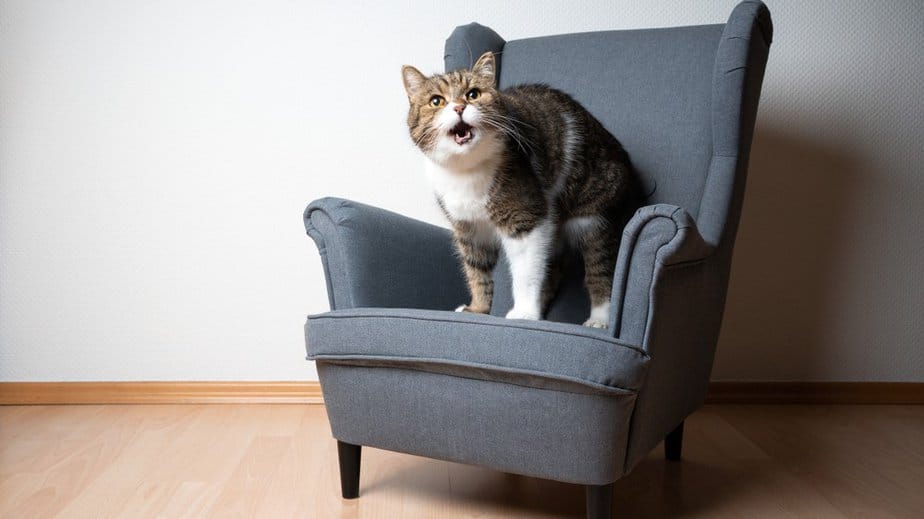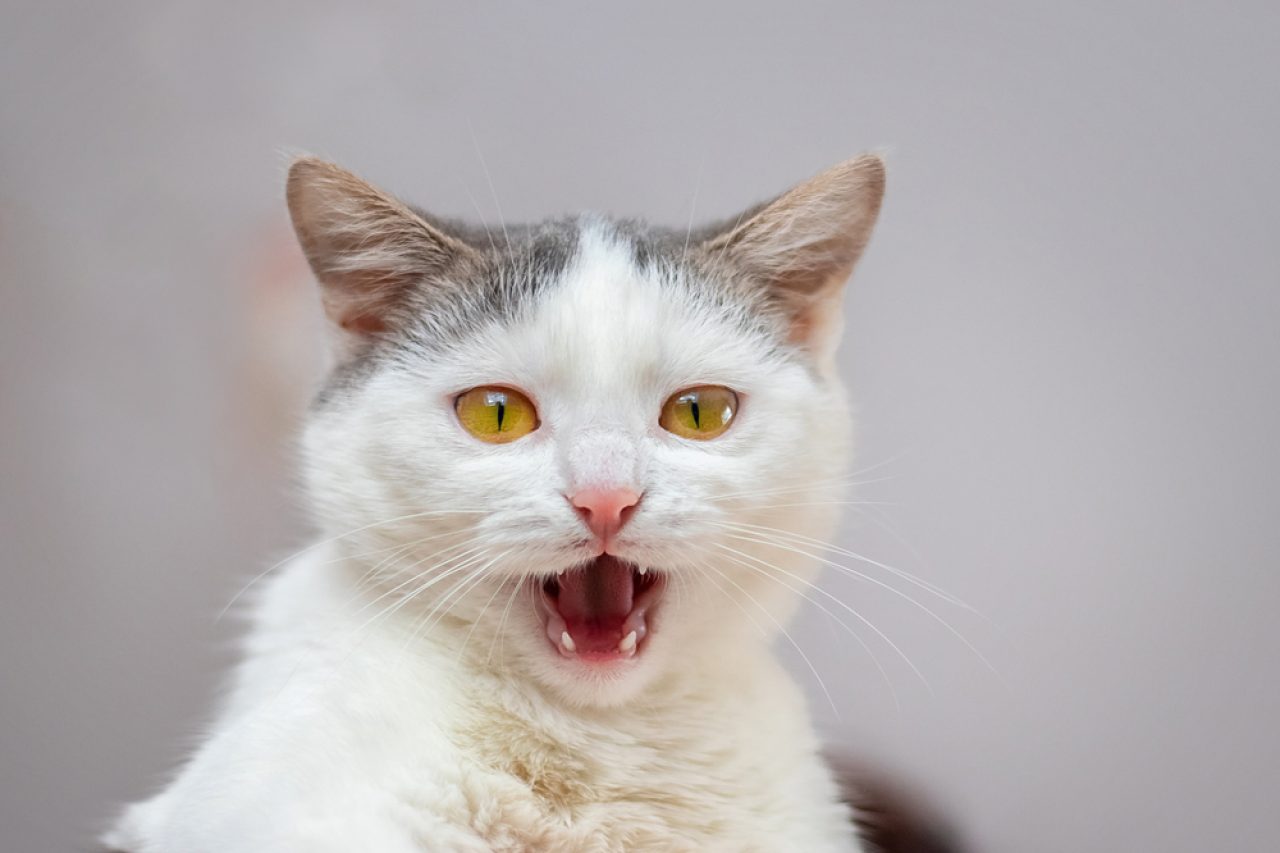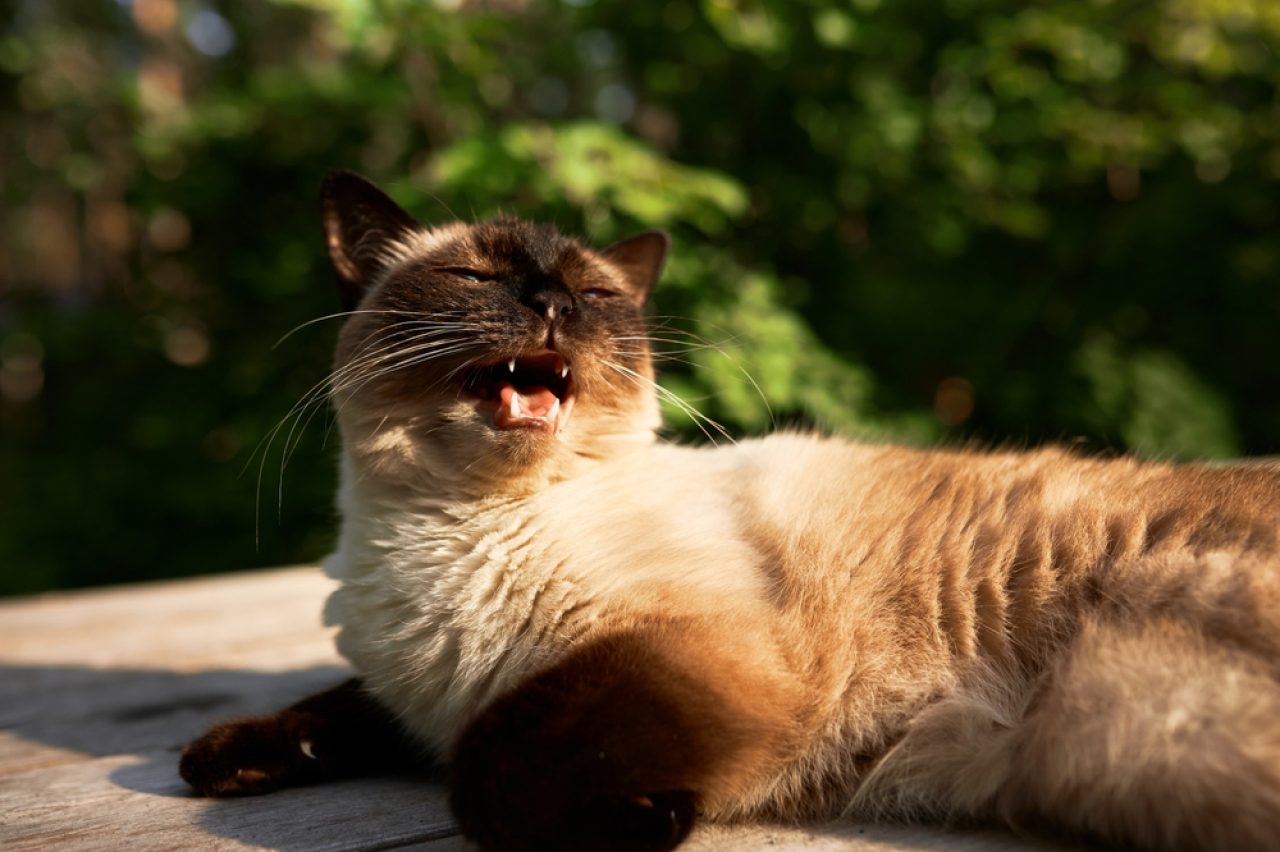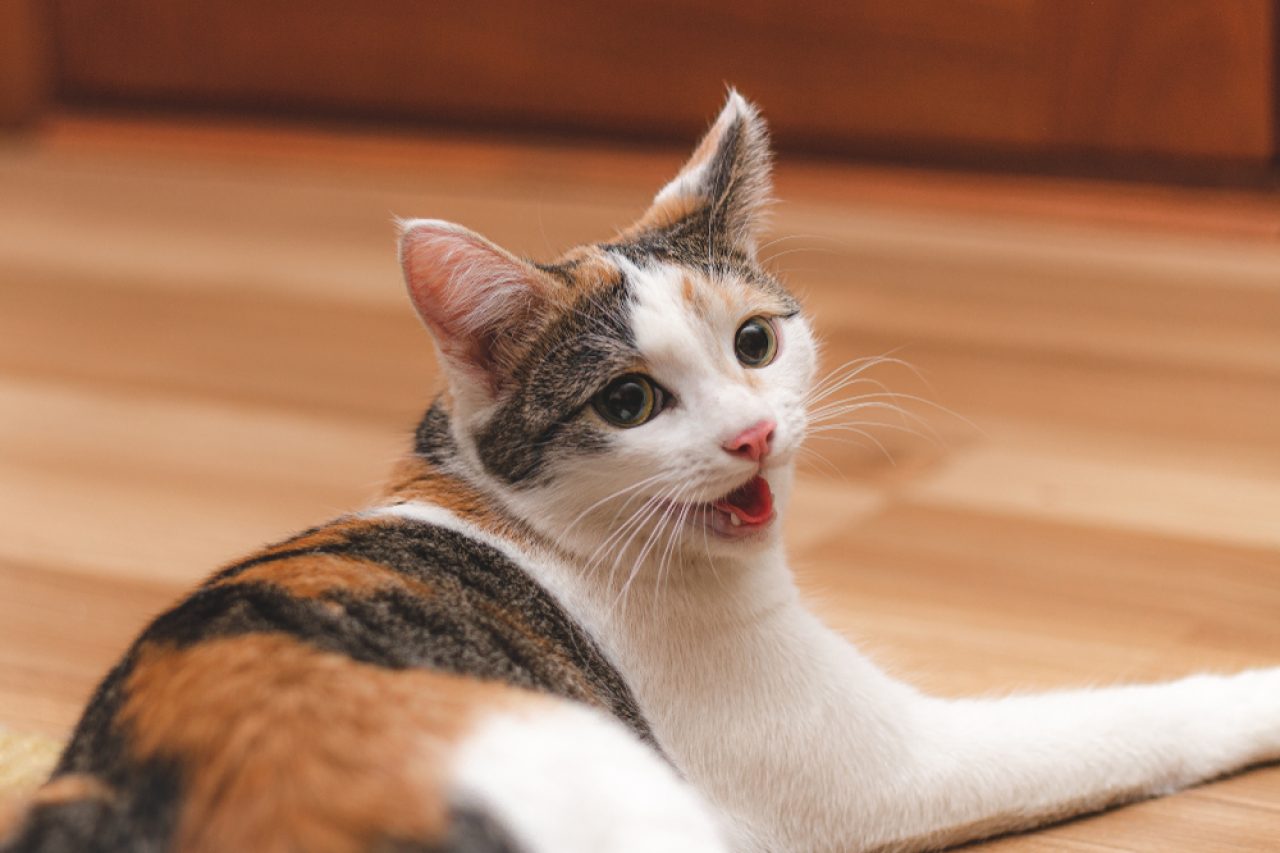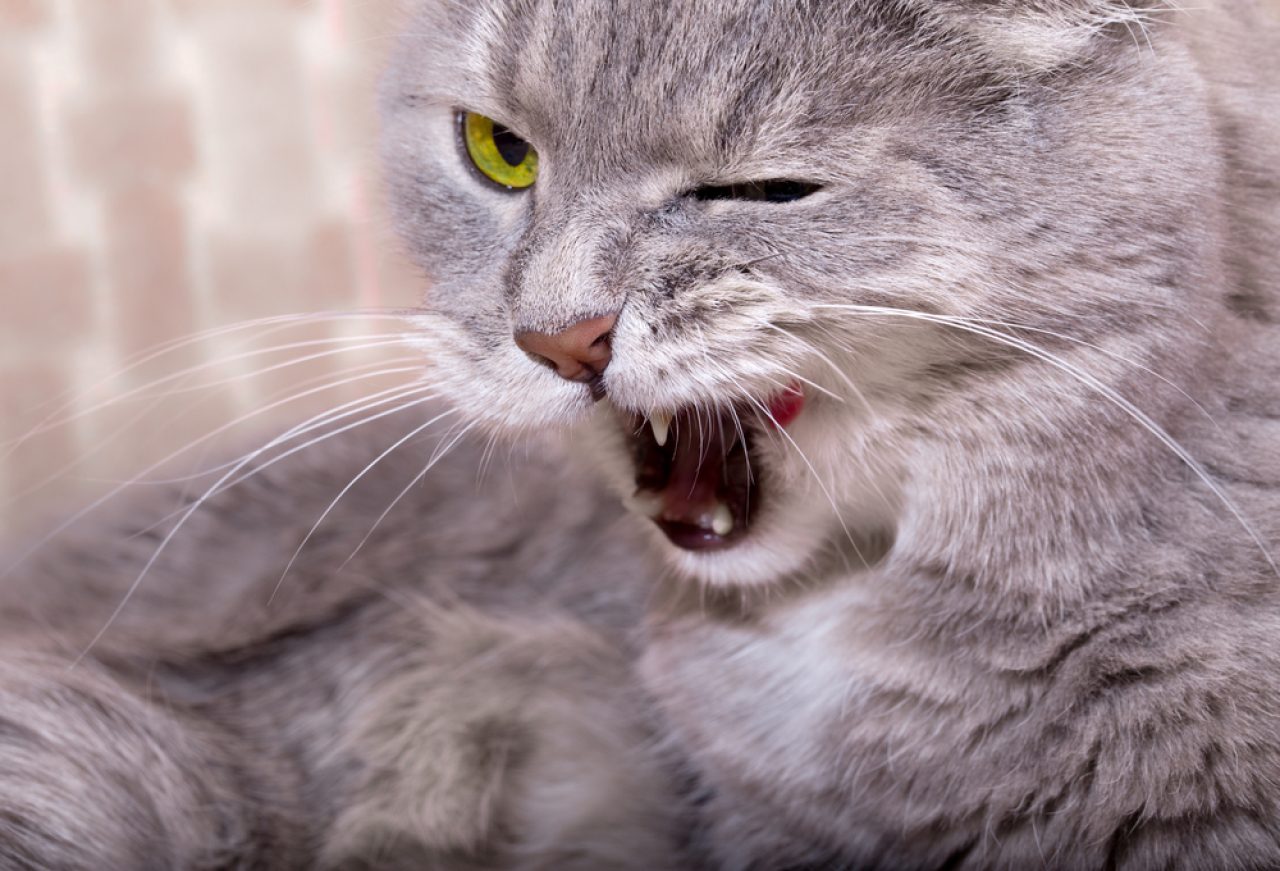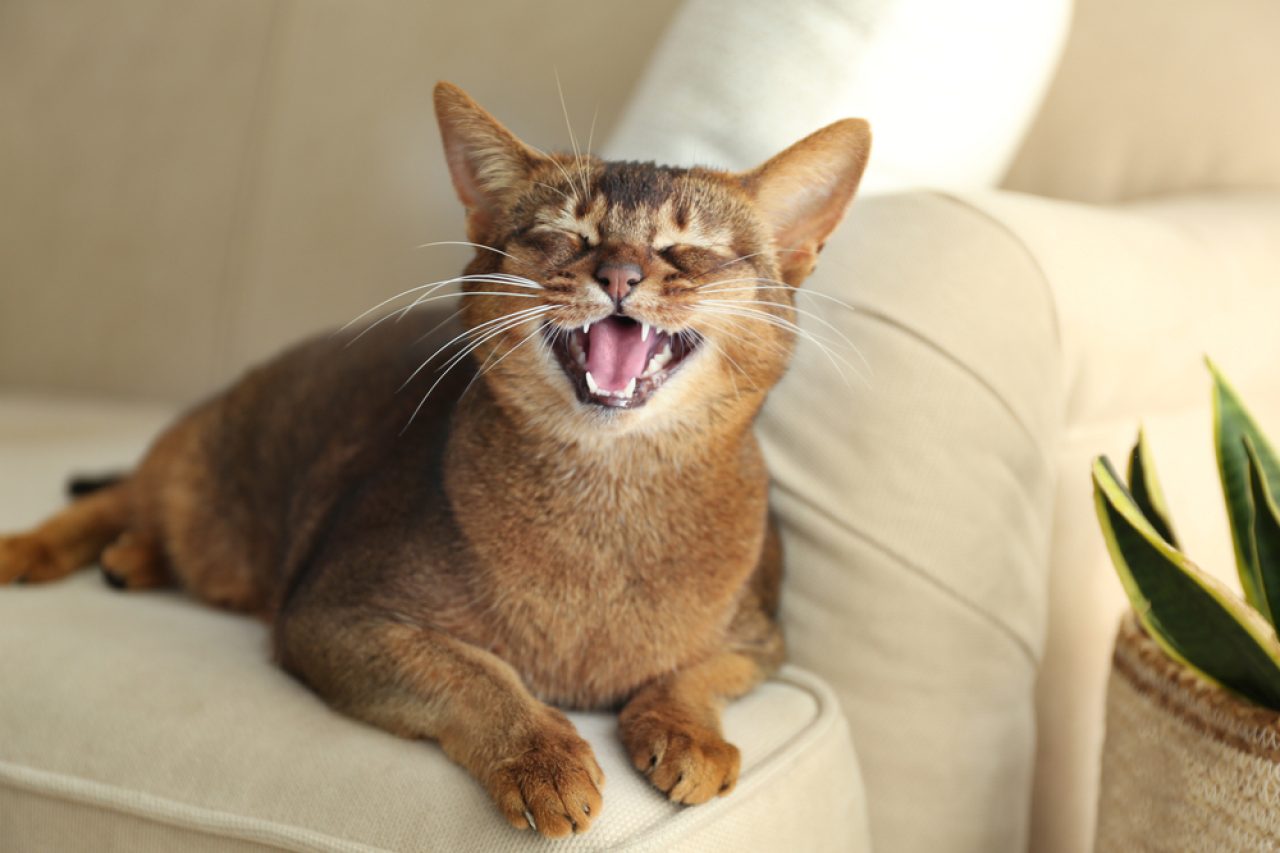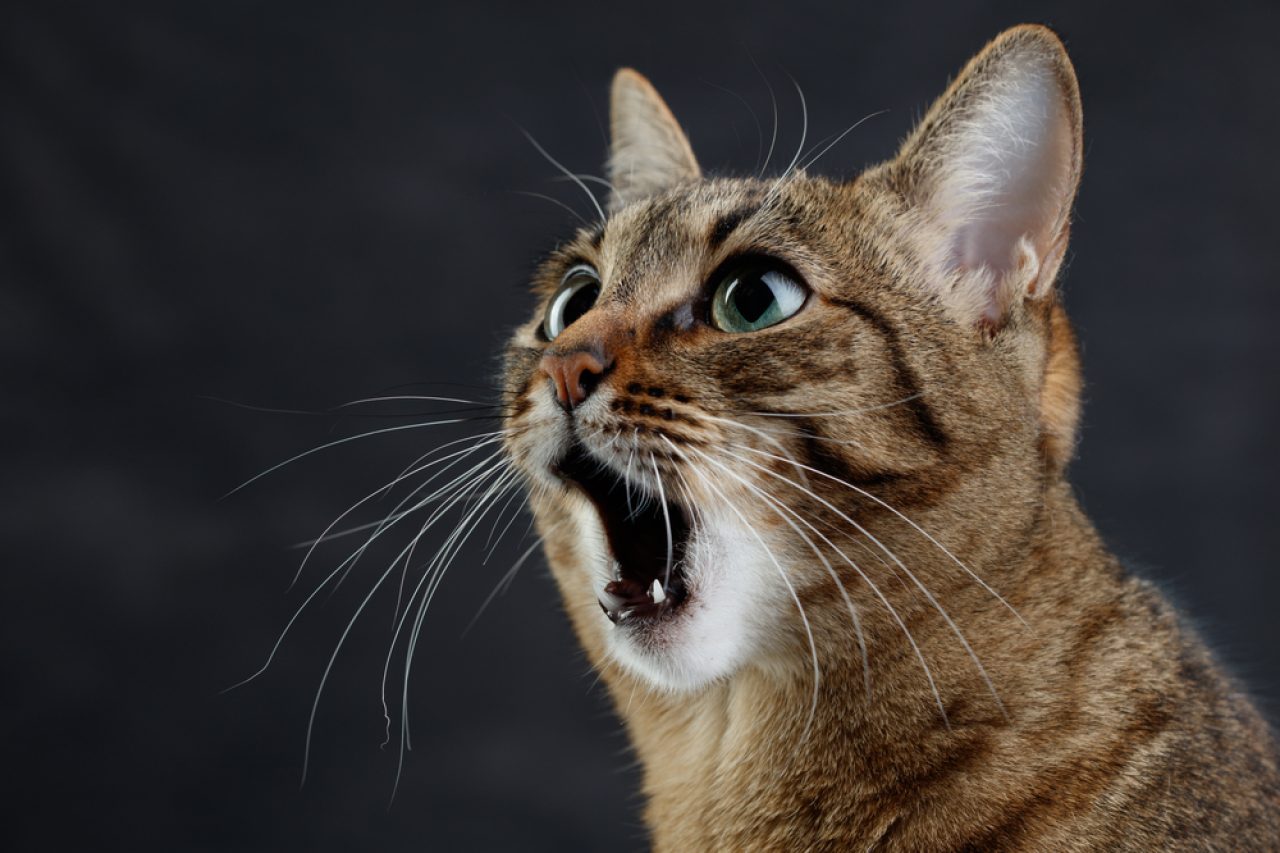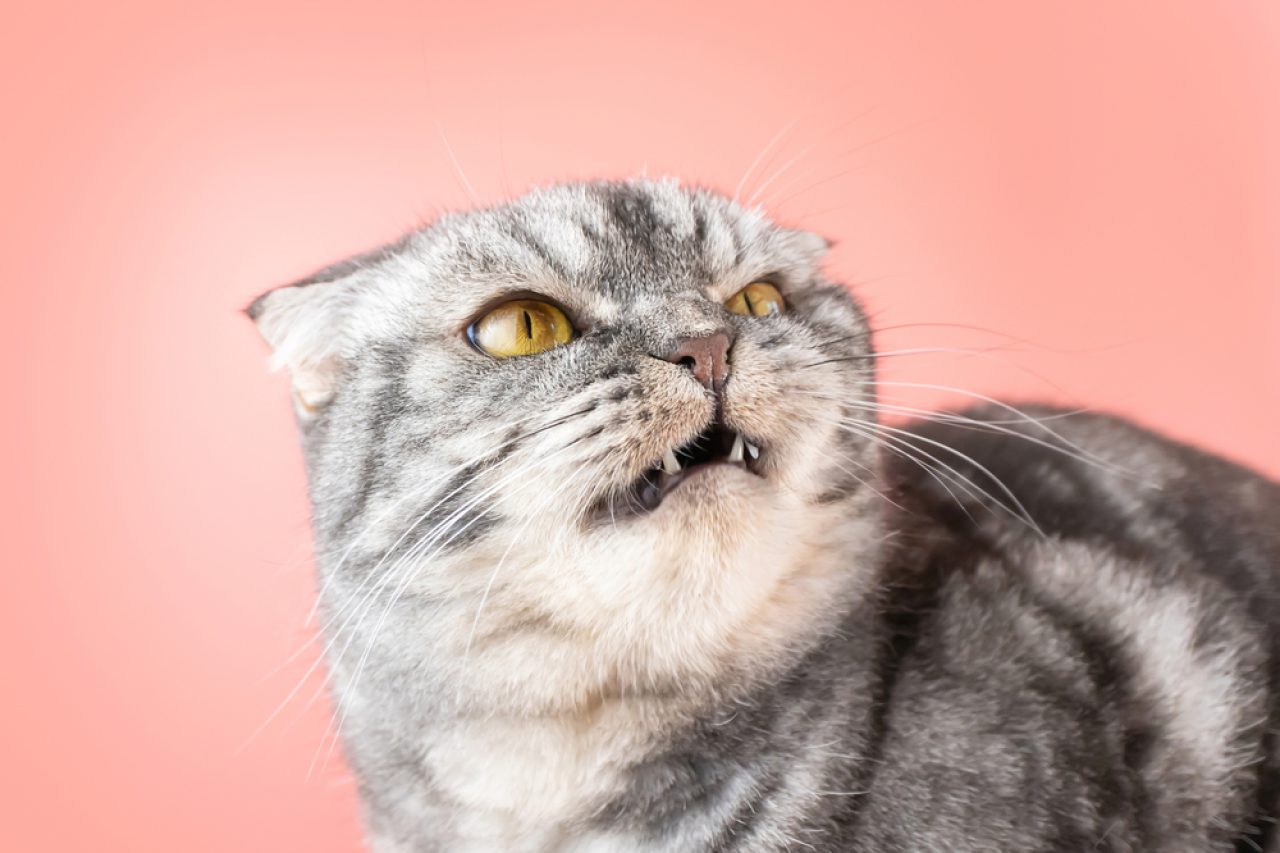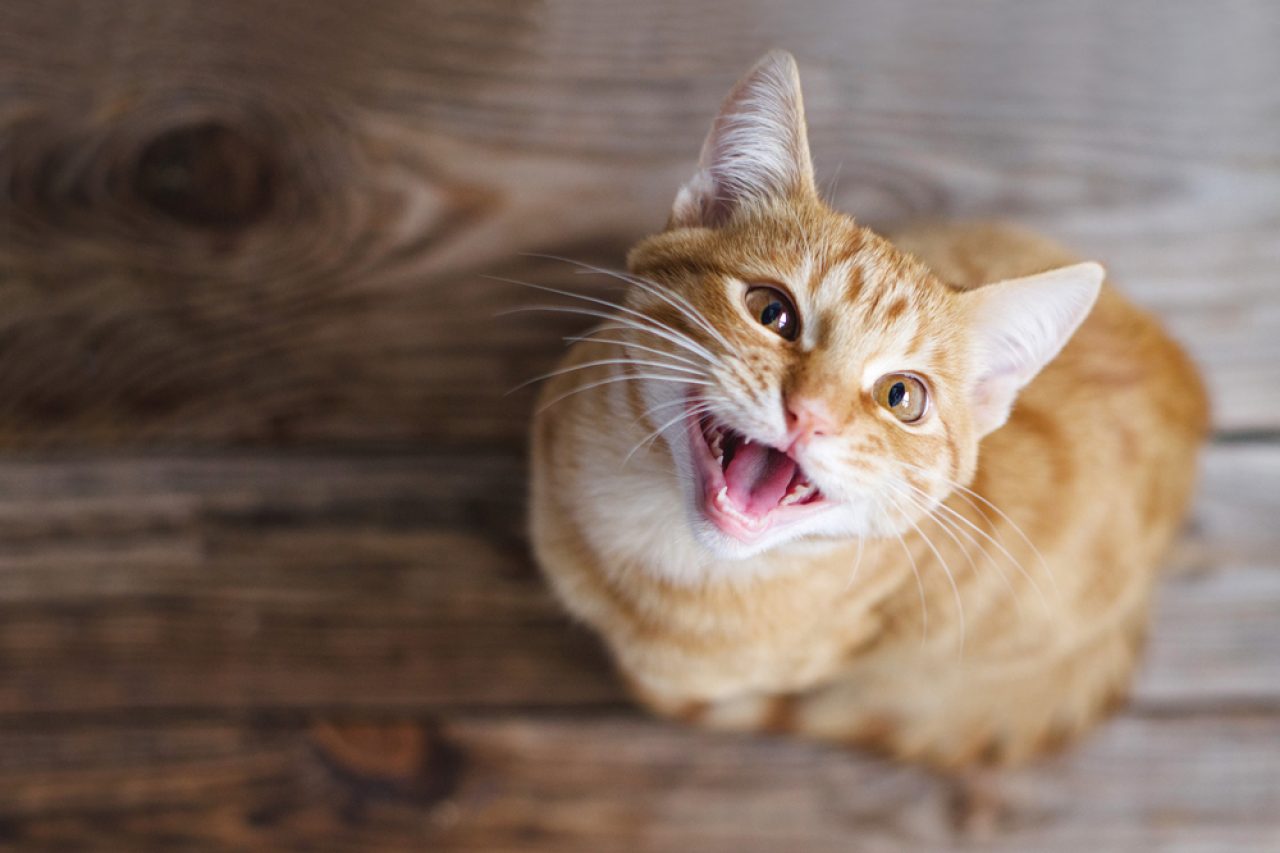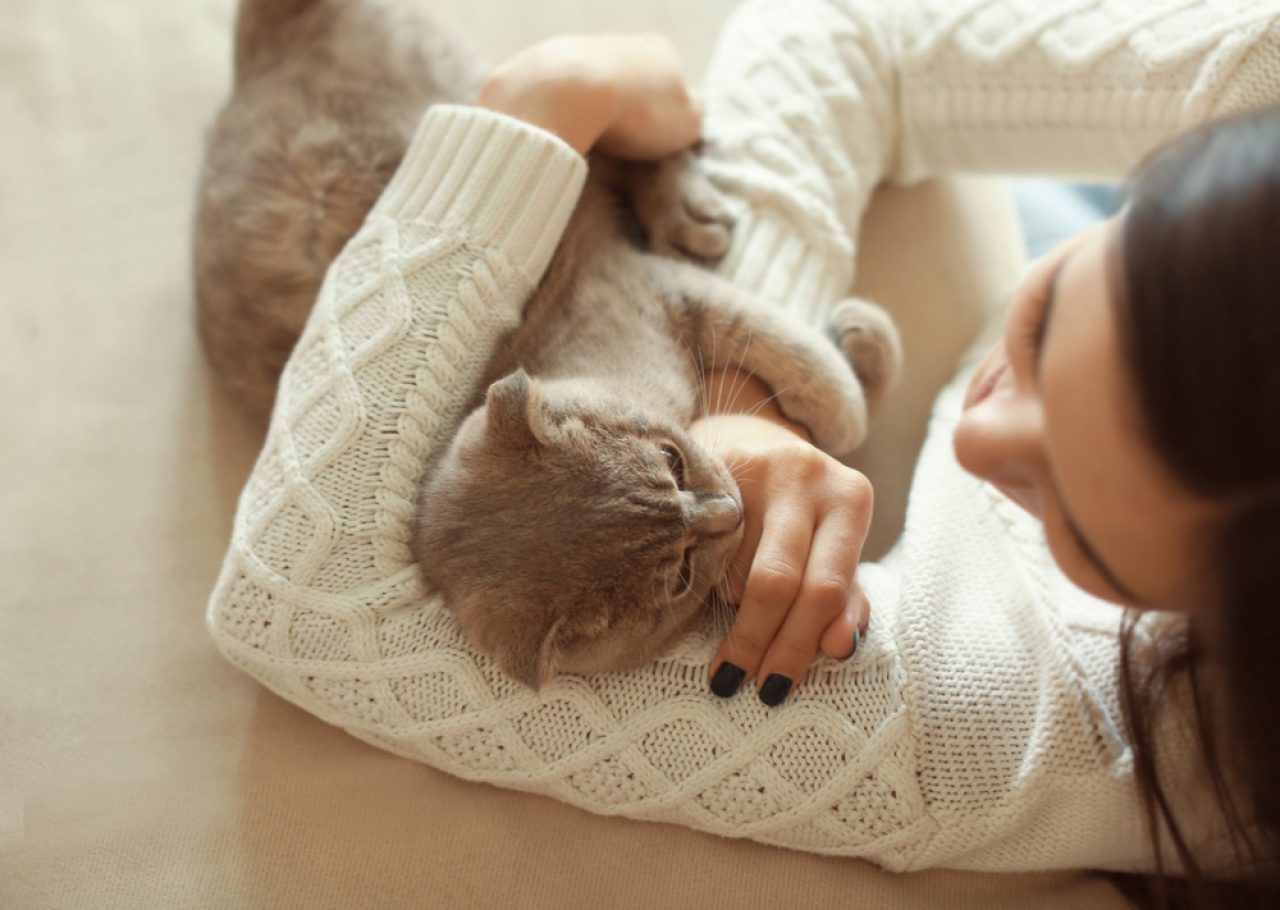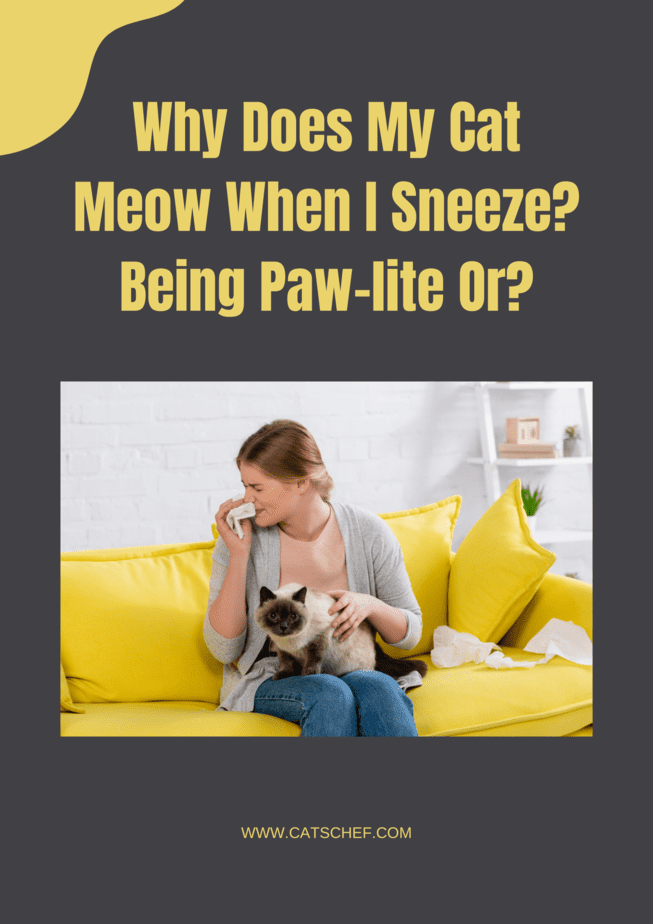📖 Table of Content:
It’s allergies season. You’re sitting on your bed with an itchy nose, about to sneeze. And suddenly, you let out a relieving “Achoo!” feeling slightly better. But then you hear your cat meowing and looking strangely at you. So, you wonder, “Why does my cat meow when I sneeze?”
I actually find it really funny how some people would never in a million years wonder why a cat meows after a sneeze. They probably think, “Well, it’s a cat, of course it meows. That’s what cats are supposed to do.”
While other people, those who treat cats like some kind of deity, will not only wonder about it but make it their life’s mission to find out the answer!
Sometimes it’s hard to tell why cats do the things they do. Since we’re not fluent in Cat, we can only guess what’s the meaning behind their peculiar behavior. And even though a meow is not that strange, it’s also weird when it comes as a response to most of the things we do.
At the end of the day, we’re just trying to understand our little fluffballs in order to make their life as enjoyable as possible. But guess what: our cats are trying to do the same!
As much as we find some of their behaviors weird, they also struggle to figure out how some of our habits make sense to their little cat brain.
Okay, they might not be that invested in finding out why we all of a sudden let out a weird achoo noise. But if you do happen to ask yourself from time to time, “Why does my cat meow when I sneeze?” then you’re at the right place.
Prepare yourself for some meow-blowing information.
The science of meow
All cats make all kinds of sounds, from meowing and purring to chirping and hissing. The reason why they are so vocal ranges from wanting to greet us to seeking attention. They also emit different sounds to express different emotions like happiness, contentment, anger, annoyance, and so on.
Kittens are usually more communicative than older cats, which makes sense since they’re still young and trying to get the know the world that surrounds them. As they get older, they let go of the meow, resolve to other vocal expressions for communication and rely more on other senses for exploring their surrounding.
But when it comes to the meow sound, older domestic cats almost only meow to humans and very rarely to other cats. So in a way, a meow is specially reserved for us!
The reason behind them meowing only to us is that adopted domestic cats never got to experience “growing up” and living in the wild. Their owners constantly nurture and baby them so they are able to preserve their kitten spirit.
Therefore, around us, they still feel like little babies and we have to always continue taking care of them. Something which they have nothing against (and neither do we!).
A meow can last between a split second or several seconds and can even begin or end with some other sound like a thrill or howl. Cats meow either to communicate a need or to express displeasure. Or to greet us when we finally arrive home.
Now that we established that a meow is our cat’s way of addressing us, let’s continue with our topic.
Cats and loud noises: Could you whisper, please?
Before dealing with cats and sneezes, we have to talk about cats and loud noises.
Just as sudden, loud noises scare us, so do they scare our furbabies. And not just the loud ones, but even those everyday sounds we probably don’t notice while your fluffball hates them.
The feline sense of hearing is significantly more sensitive than humans. Cats’ ability to hear indistinct sounds and high pitches is a true miracle. We could even say it is their most important survival mechanism.
Most cats have those pointy upright ears with 30 to 32 ear muscles, depending on the breed. For this reason, cats can easily respond to sounds. What those muscles essentially do is contract the sounds in the middle ear that the cat detects. This helps to reduce sound transmission while protecting the inner ear.
There is also an incredible difference between a hearing range of a human and a cat. As you probably know, cats are able to hear sounds that humans are not. They can hear up to a range of 64,000 Hz, which is three times more than humans can.
And when it comes to volume, most human conversations range from 60 to 80 dB. Which is good because that’s a comfortable range for cats too. But an average adult human sneeze can reach 90 dB, which is something that alerts your cat (especially when it’s sudden, and a sneeze always is).
Even though your cat’s hearing abilities are very admirable, they also cause many troubles to her. For your little feline baby, it is both a blessing and a curse.
Does my cat understand what a sneeze actually is?
Even cats sneeze sometimes. It could be due to a simple nose tickle, dust particles, some harsh smells, or even due to respiratory infections. Either way, cats do it, too.
However, their sneeze is significantly different than ours (especially from their perspective).
So, if you’re not constantly sneezing, then your cat is probably not familiar with that sound. Therefore, your furball is easily alerted and scared.
And if you are a single cat parent, or you happen to have a kitten instead of an older cat, then your cat might not be familiar with the cat version of sneezing. So the poor thing might be scared of her own sneeze when it eventually happens.
Sneezing is something inevitable and it’s only a matter of time before your kitty will be introduced to it. Your cat might meow, which is the most common reaction, or respond differently. You’ll find out more about different responses below.
Why does my cat meow when I sneeze? 5 possible reasons
After we’ve gone through everything there was to know, from meowing through loud noises to a sneeze, now it’s time to mention possible reasons why cats meow when we sneeze.
I’ve opted for the five most common ones and I’m sure your cat fits into one of them. So, let’s go!
1. You startled your cat
As mentioned above, a standard adult sneeze is a very loud and sudden sound. But we all know that one person who is extra dramatic when sneezing (if you don’t, then you just might be one).
We’ve concluded that cats are very sensitive to sounds. The process we’ve mentioned of reducing the sound transmission and protecting the inner ear is too long for a sudden sneeze. Your cat’s ears have no time to adjust, and therefore she ends up startled.
Cats like their life to be pretty peaceful. Anything weird and out of the blue will most definitely cause some kind of a reaction in your cats. A meow is nothing to worry about. It’s just your cat’s way of saying, “Meow! What was that, buddy?!”
2. You scared your cat
Being startled and scared almost go hand in hand. Not every cat who gets startled by a sneeze will also be scared, but every cat who gets scared by a sneeze will also be startled.
Most of the time, our sneezing doesn’t just include sudden loud and weird noises. There are usually some sudden movements like slight bouncing or jumping and even some facial contortions.
So, it is perfectly normal for our cats to end up scared after witnessing all of that and having their peace disrupted.
And, don’t worry. Your cat is not scared of you. It’s just the sneeze she has a problem with. You know it from your own experience, right? Countless times you’ve been scared by a sneeze, but you didn’t remain afraid of the person sneezing, right?
3. You annoyed your cat
“Why does my cat meow when I sneeze? I swear, it keeps happening all the time!”
It could be that your actions annoyed her. Or your sneeze annoyed her, to be honest. (Don’t take it personally).
Cats are famous for their bold and arrogant character and you should know about their presumptuous behavior by now. Whether you are petting them too much or too little, you’re taking your twenty-fifth picture of them for the day, or you’re suddenly sneezing, you’re actions might annoy your cat.
So, don’t worry. Your cat’s meow is her way of asking, “How dare you disrupt my peace, peasant?!”
4. Your cat might think you hissed at her
Cats usually hiss when they’re under stress, in pain or when they’re irritated. If your cat mistakes your sneeze for a hiss, she might think you did it for the same reason she does.
Depending on the situation and the mood your kitty is in, she might meow to determine what’s wrong with you. Why are you stressed or irritated, or what caused you pain? So considerate, right?
However, that meow might be followed by her own hiss.
5. Your cat might be imitating you
And finally, the thing people are most fascinated by is that your kitty is meowing after your sneeze because she might be imitating a human response.
Cats are highly intelligent animals and if they live among humans for a long period of time, they will most definitely mimic their owner’s behavior. You’ve probably seen many videos on the internet of cats singing, opening doors, and even making the bed.
So, if your cat meows at you after you sneeze, especially if she’s familiar with that sound, then that just might be her way of saying, “Bless you, hooman!” How adorable is that!
Other possible responses to sneezing
“Why does my cat meow when I sneeze?” – this is a common question that many cat owners ask themselves on a daily basis. But, some cats might not just meow at you. Or might not meow at all but have a different response altogether.
Here are five possible responses your cat might have when you sneeze instead of meowing. Let’s see if your fluffball did any of them, as well.
1. Chirping
Chirping is that weird sound our cats make when they’re staring out the window, watching birds or squirrels.
It’s hard to determine why cats produce that weird sound. Some say cats chirp to provoke the prey. But others believe they chirp out of excitement. Therefore, if we combine these two reasons, cats chirp because they are excited to see a bird or a squirrel.
So, if your lovely cat chirps after you’ve sneezed, that means she is excited by that sound and thinks you want to play with her. This is a very rare response to sneezing, but if your cat does it, then now you know what it means.
2. Running away
This might be a very common response for cats who are easily startled and scared. We’ve mentioned several times the degree of a cat’s sensitivity to sudden, loud sounds, so this is another natural response. Especially if you’re cat isn’t familiar with the sneezing sound.
So, if your cat is easily scared by any sudden sound, your sneeze will definitely make her run for her life.
3. Showing agitation
If your cat doesn’t meow when you sneeze, make any kind of vocalization or run away, then she will most definitely show her agitation in some way or the other.
She might be minding her own business, licking her paws, and then suddenly looking at you with complete disgust because your sneeze disrupted her peace.
Or she might be lying on your lap while you both are watching Pride and Prejudice. And then decide to sit at the other end of the couch because your loud sneeze ruined her favorite part of the movie. (Yes, the part when Mr. Darcy says, “You have bewitched me, body and soul, and I love, I love, I love you.”)
Either way, your cat will make sure you acknowledge her agitation levels.
4. Staring at you
Ah, the famous cat stare! You don’t even have to sneeze in front of a cat to know what I’m talking about.
Cats have the ability to stare into your soul and unlock hundreds of new insecurities you never knew you had. So, if your cat just simply stares at you after you sneezed, it might be her way of asking you, “Is that really how you look when sneezing, Patricia?”
Or, you know, she might be staring because she’s worried about you, and she’s anticipating what’s going to happen next. You decide what version you’re going to believe to be true.
5. Attacking
Attacking is probably the last line of defense. Depending on how loud the sneeze was and how startled and scared your cat is, she might first meow at you, then hiss, and then attack you. Or skip the first two and attack you immediately.
The reason why your cat attacks you after you sneeze is that, as we’ve mentioned above, they might mistake your sneeze for a hiss. Therefore, they will react accordingly and defend themselves. The loud sneeze might startle them to s-purr into action.
But, don’t worry. The attack doesn’t last long. Even some humans, when scared, might try to hit the person who scared them. That’s our natural first reaction and self-defense method. When your cat establishes you’re not trying to hurt her, she will go back to an angel mood.
Is there something I can do about it?
Since meowing and other responses to sudden noise are your cat’s natural instincts, there’s pretty much nothing you can do about it. Just as there’s likely to be no chance for you to stop the sneeze (I mean, you can postpone it, but eventually, you’ll have to let it out).
You could try to work with your cat and get her to become more familiar with the sneeze sound. You could pretend to sneeze, starting with quiet sneezes and making them louder each time. Your cat might probably react to your fake sneezes as well, but if you continue doing it, one day, she might not.
In the beginning, your pretend sneezes might scare your furbaby and she might react defensively by attacking you or running away. But, as time goes by, her reactions might be calmer and calmer. And when you reach the calmest response from her, you could give your cat a treat.
That way, your cat will learn that a sneeze is nothing to be afraid of and that it will probably result in a yummy treat. If you think your cat will start expecting treats after every sneeze, think of it as a future problem to deal with.
Chances are your cat will always have some kind of reaction to your sneeze. But, a single meow is definitely better than a hiss or scratches. Anyway, this could be a fun experiment for you and your cat to try.
Final thoughts
“It’s such a relief as I finally know why does my cat meow when I sneeze.” I know that’s what you’re thinking right now.
The important thing to remember is that there’s no need to worry if your feline companion does meow after your sneeze. It is perfectly normal for them to meow at pretty much anything we do.
My cat, Miss Luna, a Calico beauty, is a very vocal cat and in the beginning, I thought she was meowing because she was hungry. But I soon realized that no matter how many times I fed her, she will still meow at me.
So, after several second breakfasts and third dinners per day, and an unnecessarily anxious vet visit, me and my family decided that that’s just the way our little diva is. And it became our inside joke, something only we, amongst our family members and friends, can relate to.
My mom acts as though she’s annoyed by her constant meowing (but I know she secretly loves it), and my dad and I are continuously amazed by our little meowsical genius.
So, don’t worry too much. If you did your research and consulted professionals and found out your cat is perfectly fine, let her meow her way into your heart. And remember, she’s just trying to communicate with you.
The sad thing is that we can never be one hundred percent certain what their meow means. Just as our furbabies would never know for sure why we are making that weird “Achoo!” sound from time to time.
Somewhere, in a parallel universe, we are able to talk with our cats. And that’s what I call a purrfect world.
